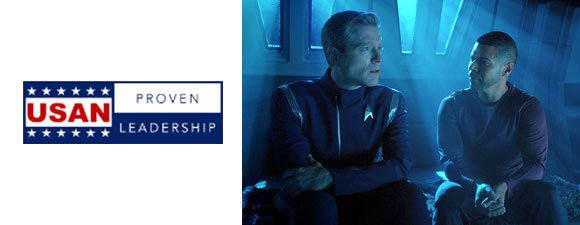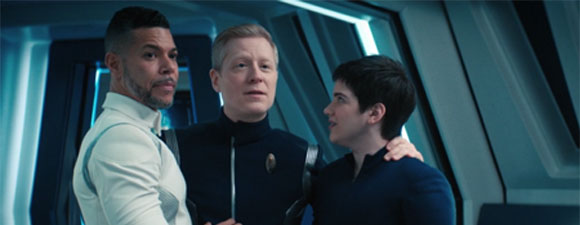William Shatner Presents: Chaos on the Bridge Review
3 min read
The Story
William Shatner Presents: Chaos on the Bridge is the story of the first few seasons of Star Trek: The Next Generation.
Shatner interviewed many involved with the show in its infancy; including producers, television executives, writers, actors, and other behind-the-scenes personnel.
The first two years of The Next Generation were turbulent, and writer turnover was very high, with thirty leaving in those early years. Writers weren’t the only ones having problems; actors and producers and Gene Roddenberry himself were often at odds with one another.
Shatner’s purpose for making the documentary was to show the power struggles involved in creating the new series. There were plenty of them to chronicle, beginning with Roddenberry’s desire for a Star Trek that conformed to what he believed humanity would become in the future, which made storytelling difficult.

Details
The documentary, written and produced by Shatner, runs one hour in length and it is available via multiple digital platforms, both in the US and in the UK.
Interviews were conducted with John Pike (then president of Paramount Television), D.C Fontana, David Gerrold, Maurice Hurley, Richard Arnold, Susan Sackett, Rick Berman, Jeffrey Katzenberg, Jeffrey Hayes, John de Lancie, Denise Crosby, Sir Patrick Stewart, Ronald D. Moore, David Livingston, Gates McFadden, Herman Zimmerman, Michael Okuda, Jonathan Frakes, Tracy Tormé, Lolita Fatjo, Diana Muldaur, Les Moonves, Brannon Braga, and Ira Steven Behr.

The Review
For Star Trek fans, this is a fascinating glimpse behind the scenes of making a new Star Trek series. Original series fans at the time were leery of a new Star Trek without Captain Kirk, Mr. Spock and Dr. McCoy and they were not alone. Shatner himself felt a “sense of loss” when his crew was passed over for new blood, and it was obvious that it wasn’t just for the money for the actor was sad to be passed over for a new captain.
Stories from those first years of The Next Generation are told, with interviews from all involved, save Roddenberry. Some stories have made the rounds before; others were, at least to this reviewer, new and interesting.
The issues over writing the pilot, Roddenberry’s interfering lawyer, selecting Captain Picard, and above all, Roddenberry’s insistence that humanity would work past their petty dramas in the 24th Century made for drama among those involved with creating the series. Writers locked horns with Roddenberry and his lawyer and in sharing their stories with Shatner, one can see their frustration, even years after the fact.
For someone who hasn’t read a lot about those early days, Chaos on the Bridge is fascinating. A long-term Trek fan, this reviewer didn’t know that Q wasn’t in the original Encounter at Farpoint pilot, why he was added, or who created one of the more popular Next Generation guest characters.
The controversy when Gates McFadden was replaced by Diana Muldaur for a season was one of the more interesting segments of the special and it was illuminating to hear from both women.
It took until the third season until things finally started to settle down, and viewers will understand how and why the drama and in-fighting finally began to ease, and how The Next Generation stepped out from the shadows of its elder brother and began to build its own loyal fanbase.
The interviews were quickly-paced. Shatner did not spend a large amount of time with any one person, but flitted from interviewee to interviewee, which gave him the ability to interview a large number of people involved in the early days of The Next Generation.
The comic-book Western-style graphics were attractive and a bit different.
William Shatner Presents: Chaos on the Bridge is worthy of a watch, perhaps more than once, to catch everything that was presented. Even if one has read a great deal on the early days of The Next Generation, it would be productive to watch this documentary as a great deal of ground was covered in the interviews.







Bill Shatner in fact took a lot of time with his interviewees. He listened carefully, and the questions were his own. He really impressed me with his thought process, although in my case he did not use a lot of my material.
Take that as a compliment that there wasn’t so much drama going on with your colleagues 😀
Thanks for everything you’ve done for Trek over the years. 🙂
In that case, extended interviews would be a great bonus feature when the film eventually comes to DVD.
Well, I hope it looks better than that terrible poster art. The fonts look like they were chosen rather quickly.